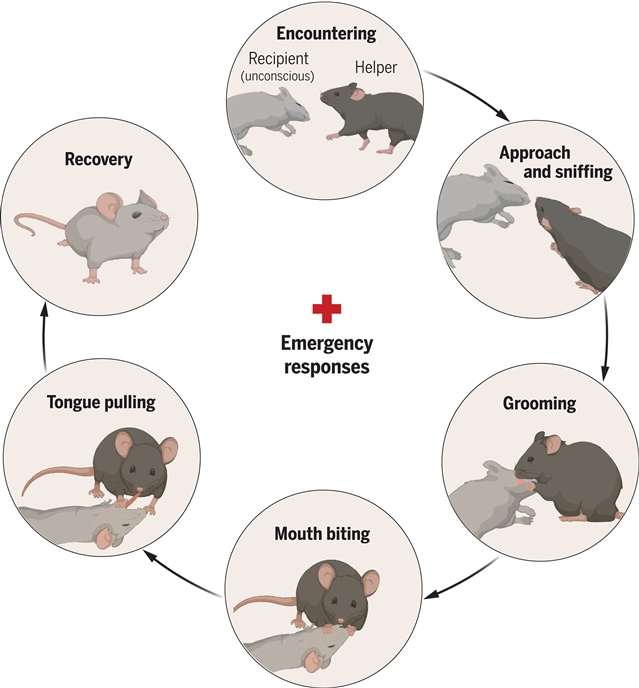
啮齿类动物对无意识或死亡同种动物的恢复式亲社会行为,这一成果由美国南加州大学
研究小组报告说,老鼠对无意识的或死去的社会伙伴表现出刻板的行为,从嗅闻和梳理到更有力的行为,如咬嘴或咬舌头和拉舌头。后一种强烈的行为,在熟悉的伴侣中更为突出,开始于长时间的不动和不反应,并在伴侣恢复活动时停止。他们的结果,包括改善气道开放和清除,加速从昏迷中恢复,表明类似于救援的努力。下丘脑室旁核中的催产素神经元对无意识伴侣和活跃伴侣的反应不同,它们的激活,以及催产素信号,是恢复行为所必需的。这种帮助反应迟钝的成员的倾向可以增强群体凝聚力和社会物种的生存。
据悉,尽管人类表现出紧急反应来帮助无意识的个体,但非人类动物对无反应的同种动物的反应却鲜为人知。
附:英文原文
Title: Reviving-like prosocial behavior in response to unconscious or dead conspecifics in rodents
Author: Wenjian Sun, Guang-Wei Zhang, Junxiang J. Huang, Can Tao, Michelle B. Seo, Huizhong Whit Tao, Li I. Zhang
Issue&Volume: 2025-02-21
Abstract: Whereas humans exhibit emergency responses to assist unconscious individuals, how nonhuman animals react to unresponsive conspecifics is less well understood. We report that mice exhibit stereotypic behaviors toward unconscious or dead social partners, which escalate from sniffing and grooming to more forceful actions such as mouth or tongue biting and tongue pulling. The latter intense actions, more prominent in familiar pairs, begin after prolonged immobility and unresponsiveness and cease when the partner regains activity. Their consequences, including improved airway opening and clearance and accelerated recovery from unconsciousness, suggest rescue-like efforts. Oxytocin neurons in the hypothalamic paraventricular nucleus respond differentially to the presence of unconscious versus active partners, and their activation, along with oxytocin signaling, is required for the reviving-like actions. This tendency to assist unresponsive members may enhance group cohesion and survival of social species.
DOI: adq2677
Source: https://www.science.org/doi/10.1126/science.adq2677
